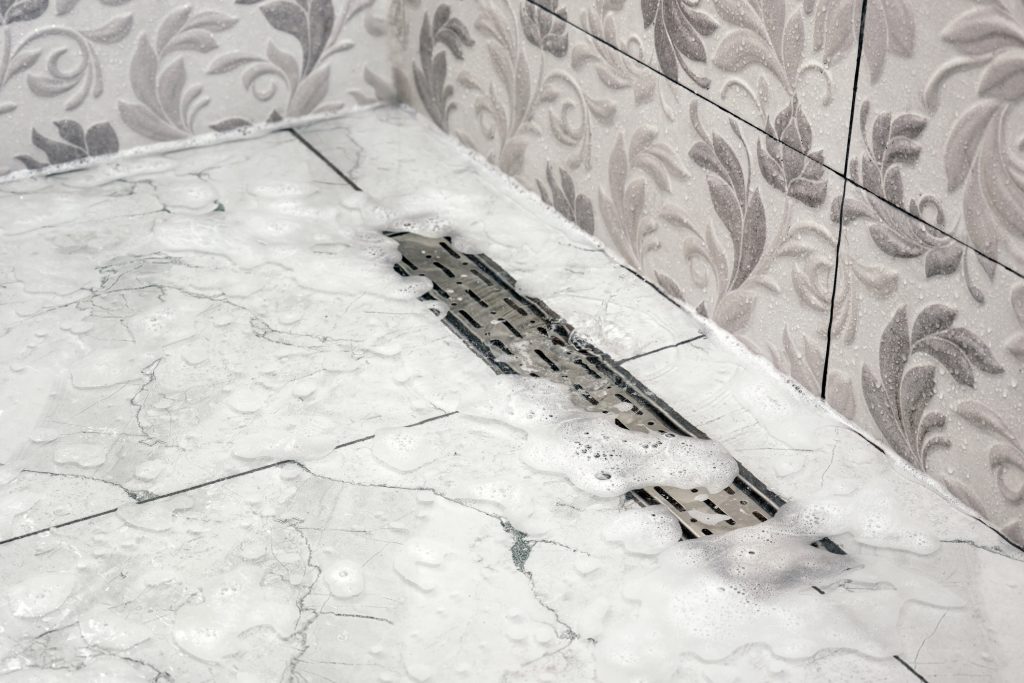Shower drain clogs are one of the most frustrating plumbing issues homeowners face, especially in growing communities like Frisco, TX. These seemingly minor blockages can escalate quickly, leading to expensive repairs, water damage, and persistent drainage problems. Fortunately, with a few preventative habits and regular maintenance, you can avoid the headaches, and the costs, that come with a clogged drain.
In March, rising humidity and seasonal shedding often make shower drains more vulnerable. Hair, soap scum, and mineral buildup can silently collect beneath the surface, restricting water flow over time. That’s why it’s important to get ahead of the problem before it starts. By understanding the causes of clogs and knowing when to bring in a plumbing professional, you can keep your shower running smoothly year-round.
Whether you’re a longtime homeowner or new to the Frisco area, taking proactive steps today can help protect your plumbing tomorrow. And if you’re not sure where to start, don’t worry, we’re breaking down exactly what leads to clogs and how to stop them in their tracks.
With help from trusted experts like Benjamin Franklin Plumbing of Dallas, you can keep your home’s plumbing in top shape and avoid unnecessary damage caused by preventable shower drain issues.
Why Shower Drain Clogs Are a Bigger Problem Than You Think
It’s easy to dismiss shower drain clogs as a minor inconvenience, but they often signal deeper plumbing issues. What starts as slow-draining water can turn into standing water, pipe corrosion, or even mold growth behind your bathroom walls. In places like Frisco, TX, where rapid development and hard water are common, these problems tend to build up faster than expected.
When water can’t flow freely through your plumbing, pressure increases inside your pipes. Over time, this pressure may cause pipe joints to weaken or crack, especially in older homes. The result? Expensive leaks, structural water damage, and potentially thousands of dollars in repairs. And if the clog becomes severe enough, it could even lead to wastewater backing up into your home.
Shower drain clogs also attract bacteria and pests. Standing water provides a breeding ground for mold and mildew, which can impact air quality and cause health concerns, especially for those with allergies or asthma. And if the clog is left untreated for too long, the musty smell will only get worse.
Preventing clogs doesn’t just save you money, it protects your home and your health. That’s why being proactive about your plumbing is so important. Recognizing early warning signs and knowing when to call a professional can make the difference between a quick fix and a costly emergency.

Common Causes of Shower Drain Clogs
Understanding what leads to shower drain clogs is the first step toward preventing them. In most Frisco, TX homes, clogs form gradually, often without any obvious signs until water starts draining slower than usual. While the symptoms may appear suddenly, the causes typically build up over time.
One of the biggest culprits is hair. Whether short or long, hair binds with soap residue to form a sticky, tangled mass that traps other debris. Over time, this gunk hardens and creates a serious blockage just below the drain cover. In households with multiple people, or pets, this buildup happens even faster.
Soap scum is another major factor. Many soaps contain fats and oils that react with minerals in hard water, especially common in the Frisco area. This reaction forms a filmy residue that coats the inside of your pipes, making it easier for other materials to stick and accumulate.
Mineral deposits from hard water also contribute to clogs. As water flows through your plumbing, it leaves behind calcium and magnesium. These minerals create a chalky buildup that narrows the pipe diameter and reduces water flow. The more this happens, the higher your chances of experiencing frequent clogs.
Even small foreign objects, like razor caps, shampoo seals, or bits of plastic, can accidentally fall into the drain and worsen the problem. Once caught in hair or mineral buildup, these objects become difficult to dislodge without professional help.
The Role of Regular Plumbing Maintenance in Preventing Shower Drain Clogs
Preventing shower drain clogs doesn’t always require major changes, sometimes, consistent plumbing maintenance is all it takes. In Frisco, TX, where water quality and seasonal changes can stress your plumbing system, staying on top of inspections is a smart way to avoid trouble.
Routine maintenance helps catch problems before they escalate. A trained plumber can identify early signs of buildup inside your shower drain that you might miss. They’ll also check for issues like slow drainage, unusual smells, or gurgling sounds, all of which can point to a hidden clog forming deep in the system.
One of the best benefits of regular maintenance is peace of mind. You won’t have to worry about surprise blockages or emergency repairs at the worst possible time. Instead, you’ll know your plumbing is functioning efficiently and that any buildup is being handled before it causes damage.
Benjamin Franklin Plumbing of Dallas offers professional services that include drain inspections, pipe cleaning, and system checks tailored to local water conditions. Their experienced team understands the specific challenges that Frisco homeowners face, especially when it comes to hard water and older plumbing systems.
By making plumbing maintenance part of your home care routine, you can prevent clogs from happening in the first place. It’s a simple, effective step toward keeping your shower running smoothly and your plumbing protected all year long.
Simple Habits to Prevent Shower Drain Clogs
When it comes to preventing shower drain clogs, small daily habits can make a big difference. These simple changes can help Frisco homeowners maintain clear drains and avoid the hassle of future plumbing issues.
Start by using a drain screen or hair catcher. This inexpensive tool sits over your drain and catches hair before it can wash down. It’s easy to remove and clean, and it can significantly reduce buildup over time. For households with pets, it’s especially helpful after baths when pet hair can quickly clog the drain.
Another helpful habit is regularly cleaning your drain cover. Soap residue, oils, and hair tend to collect around the edges. Wiping it down once a week helps reduce buildup and allows water to drain more efficiently. Pair this with a weekly flush using hot (not boiling) water to loosen any soft deposits forming inside the pipes.
Be mindful of what you use in the shower. Some body washes, conditioners, and shaving products contain waxy or oily ingredients that cling to pipe walls. Switching to low-residue products or rinsing with extra water after use can help keep your drains clear longer.
Finally, make drain awareness part of your routine. If you notice water draining slower than usual, take action right away. Early attention can prevent small issues from turning into stubborn clogs.
By adopting these habits, you’ll stay ahead of common culprits and protect your home’s plumbing from unnecessary stress.
How Hard Water Impacts Shower Drain Health
Shower drain clogs are often blamed on hair and soap, but what many homeowners in Frisco, TX overlook is the major role hard water plays in creating and worsening these clogs. Hard water not only contributes to everyday buildup, but it also accelerates the wear and tear on your plumbing system, leading to long-term damage if left unaddressed.
How Mineral Deposits Form Inside Shower Drains
Every time you shower, hard water flows through your plumbing system and begins leaving behind microscopic mineral traces. These traces accumulate along the inner lining of your drainpipes, gradually forming a hard crust known as limescale. This rough, uneven surface creates friction and narrows the drain opening, causing water to flow more slowly. Eventually, this restricted flow becomes a trap for other materials, leading to full-blown shower drain clogs.
Over time, these mineral deposits act like a magnet for hair, soap residue, skin cells, and even dirt. The result is a thick, stubborn clog that builds deep inside the drain, one that’s often beyond the reach of household drain cleaners or plungers.
Why Soap Scum Is Worse with Hard Water
Soap scum is a sticky film made when soap reacts with the minerals in hard water. In normal conditions, soap rinses away easily, but in hard water, it turns into a heavy residue that lines your pipes. This residue hardens when exposed to air, clinging to everything it touches, including hair, oils, and other particles that contribute to clogs.
In shower drains, where warm water is constantly used, the soap scum process is even faster. Each shower leaves a new layer behind, creating a perfect environment for the next clog to form.
The Hidden Cost of Hard Water on Your Plumbing
Hard water doesn’t just contribute to shower drain clogs, it wears down your entire plumbing system. Mineral buildup can affect the performance of showerheads, faucets, water heaters, and even washing machines. As deposits accumulate, your appliances must work harder to perform, which can lead to reduced water pressure, increased energy costs, and a shorter lifespan for your plumbing fixtures.
In the long run, untreated hard water can cause corrosion, leaks, and full system blockages that require expensive repairs. Regular maintenance and water treatment can dramatically reduce these risks.
When You Should Call a Professional Plumber for Shower Drain Clogs
While some minor plumbing issues may seem manageable, recurring or stubborn shower drain clogs often require professional help. In Frisco, TX, homeowners frequently deal with hard water buildup and aging pipes, both of which make clogs more likely and harder to fix without the right tools.
One clear sign it’s time to call a plumber is if you notice water draining slower each day. That gradual slowdown points to a blockage that’s deep within the plumbing system, where household remedies won’t reach. Persistent foul odors coming from the shower drain are another red flag. These smells often indicate trapped debris, mold, or bacteria thriving in a clogged pipe.
If you’ve tried clearing the drain with no success, or if the issue keeps coming back, don’t wait. A licensed plumber can perform a thorough inspection, locate the exact cause, and clear it effectively using professional-grade tools. They can also inspect the surrounding plumbing to ensure the problem hasn’t spread to nearby fixtures.
Another time to call in the pros? If multiple drains in your home begin acting up at once. This could signal a bigger issue with your home’s drainage system, which needs immediate attention to prevent damage.
Benjamin Franklin Plumbing of Dallas offers reliable, timely service tailored to homes in Frisco. Their technicians are trained to diagnose and fix complex clogs before they cause lasting harm. When in doubt, it’s always safer, and more cost-effective, to get expert help.
Seasonal Drain Considerations in March for Shower Drain Clogs
March in Frisco, TX signals the start of spring, and with it comes a few seasonal shifts that can affect your plumbing. While many homeowners are focused on spring cleaning, it’s also the perfect time to think about your shower drains. The changing weather, increased humidity, and even personal care habits can contribute to a rise in shower drain clogs this time of year.
One factor is seasonal shedding. As temperatures warm up, people (and pets) tend to shed more hair. This increase in loose hair can easily end up in your shower drain, where it mixes with soap residue and forms clogs faster than during cooler months. It’s a small seasonal shift, but one that can sneak up on you if you’re not paying attention.
Increased shower frequency also plays a role. Whether it’s post-yardwork cleanups or allergies kicking in with spring pollen, many households experience a higher demand on their showers. This added use pushes more debris into your drain system, which can overwhelm pipes already stressed by winter buildup.
Humidity also rises during spring, and that can cause condensation in bathroom areas, especially around poorly ventilated drains. Moist environments promote mold and mildew, which can form around partial clogs and worsen them over time.
Scheduling a seasonal plumbing check with a trusted provider like Benjamin Franklin Plumbing of Dallas is a great way to stay ahead. Catching spring-specific issues early can save you from bigger problems as the year progresses.
Why Residents in Frisco Trust Benjamin Franklin Plumbing of Dallas
When it comes to preventing shower drain clogs, Frisco homeowners know the value of working with a plumbing company they can rely on. That’s why so many turn to Benjamin Franklin Plumbing of Dallas. Their strong reputation is built on professionalism, punctuality, and a deep understanding of the unique plumbing challenges in North Texas.
Local experience makes a difference. Frisco’s water supply tends to have higher mineral content, which can lead to frequent clogs if not properly managed. The team at Benjamin Franklin Plumbing understands these conditions and tailors their services to help homeowners stay ahead of problems before they start.
One thing that sets them apart is their commitment to long-term plumbing health. Rather than offering quick fixes, they focus on thorough inspections and preventive care. Whether it’s a routine drain cleaning or a more involved diagnostic, they take the time to do the job right and explain what they’re doing along the way.
They also understand the urgency of a clog. That’s why their team is known for showing up on time and respecting your home. Their plumbers are licensed, background-checked, and trained to provide reliable service with minimal disruption.
For Frisco homeowners looking to protect their plumbing systems and avoid costly repairs, Benjamin Franklin Plumbing of Dallas offers trusted solutions with a personal touch. It’s more than just fixing pipes, it’s about delivering peace of mind with every visit.

FAQs About Shower Drain Clog Prevention
1. How often should I clean my shower drain to prevent clogs?
To avoid stubborn shower drain clogs, it’s smart to clean your drain at least once a week. This includes removing visible hair, rinsing with hot water, and checking for early signs of blockage. Regular maintenance keeps buildup from turning into full-blown clogs.
2. What are the signs of a developing shower drain clog?
Slow-draining water, foul smells, and gurgling noises are all common symptoms of developing shower drain clogs. If water begins to back up or drain more slowly than usual, it could mean a clog is forming beneath the surface.
3. Can hard water cause shower drain clogs?
Absolutely. Hard water is a major contributor to shower drain clogs in areas like Frisco, TX. The minerals in hard water create a scale that narrows the pipes, giving soap and hair more places to stick and accumulate. Over time, this leads to frequent clogs if not treated properly.
4. When should I call a plumber for shower drain clogs?
If you’ve tried to clear the clog but it’s still there, or if shower drain clogs keep coming back, it’s time to call a professional. Plumbers can inspect the entire drainage system to find hidden blockages and prevent future problems.
5. How can Benjamin Franklin Plumbing of Dallas help prevent shower drain clogs?
The team at Benjamin Franklin Plumbing of Dallas specializes in tackling persistent shower drain clogs with expert tools and techniques. Their preventative maintenance services are designed to keep Frisco homes clog-free and running smoothly year-round.






